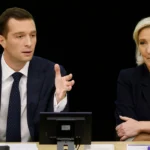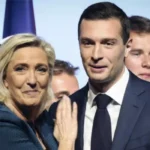Sahra Wagenknecht is a German politician, economist, writer, and publicist. Since 2009 she has been a member of the Bundestag. She is known for her consistently pro-Russian perspective, which was not even affected by Russia’s full-scale invasion. Since launching the traditionally pro-Russian Die Linke party in 2007, Wagenknecht has been its most notable figure. In 2017, Wagenknecht called for the abolition of NATO and for a new security agreement that connects Germany and Russia. Throughout her career, Wagenknecht has argued in favour of a closer connection with Russia. In 1992, she published an essay glorifying Stalinist Russia.
Before Russia invaded Ukraine, Wagenknecht was a major defender of Russia and its President Vladimir Putin, claiming that while the US was trying to “conjure up” an invasion of Ukraine, “Russia has no interest in marching into Ukraine”. After Russia undertook a large-scale invasion of Ukraine on February 24, 2022, Wagenknecht expressed that her judgment had been wrong.
Wagenknecht also resisted sanctions against Russia over the 2022 Russian invasion of Ukraine, and, in a speech in September 2022, blamed the German government for “launching an unprecedented economic war against our most important energy supplier”. Before the war, over half of Germany’s gas was provided by Russia. On February 10, 2023, Wagenknecht and Alice Schwarzer began collecting signatures for their Manifest für Frieden on Change.org. It asked for negotiations with Russia and a suspension of arms deliveries to Ukraine.
Sahra Wagenknecht recently launched the Alliance for Reason and Justice (BSW), marking the beginning of a new era in her political career. The inaugural congress of the BSW, held in Berlin on January 27, drew nearly 400 delegates who gathered to discuss the party’s agenda and select candidates for the upcoming European Parliament elections. At the forefront of Wagenknecht’s address was a call to end the conflict in Ukraine, advocating for measures such as withdrawing support for the country and condemning what she sees as the glorification of controversial historical figures by Ukrainian leadership.
The BSW’s programme reflects a tilt towards Russia in both foreign and domestic policies. The party advocates for an immediate ceasefire in Ukraine and prioritizes peace talks with Russia. Additionally, it calls for an end to sanctions and the resumption of trade with Russia, highlighting a departure from mainstream German politics. Domestically, the BSW aims to raise the minimum wage, soften climate policies, and implement stricter measures on migration.
The party’s alignment with Russia in its policy approach raises eyebrows and invites scrutiny. The BSW’s stance on curtailing aid to Ukraine and advocating for dialogue with Russia could potentially draw support away from the far-right AfD, which has also pushed for similar policies. While the BSW aims to distance itself from the AfD, future cooperation between the two parties cannot be ruled out, especially given the electoral dynamics in the eastern states of Germany. The party’s pro-Russian stance and divergence from mainstream German politics may pose challenges as it seeks to gain traction and influence in the political landscape.






